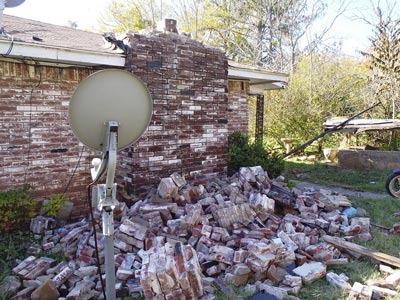
Part of the Series
Moyers and Company
A study published last week in the journal Science adds more detail to the already widely acknowledged finding that fracking leads to earthquakes.
It’s not the extraction of oil and gas that causes the tremors; it’s the method of disposing the wastewater — a byproduct of hydraulic fracturing — that’s to blame. During the process, huge quantities of water, sand and chemicals are injected into the ground to break up shale and allow drillers to access the fossil fuels trapped within. This toxic mix needs to go somewhere, and in many cases it is injected into disposal wells deep underground.
But the wastewater can travel for miles, changing ground pressures far beneath the surface. In some instances, this causes earthquakes.
The tremors have attracted the attention of regulators from El Dorado, Arkansas, to Youngstown, Ohio, but the most dramatic uptick in quakes is occurring in Oklahoma. Before fracking technology came into widespread use in the late 2000s, Oklahoma never had more than three magnitude 3.o-or-higher quakes in a single year. In 2013, it had 109. In the first five months of 2014 alone, it had 238. The state now has far more quakes per square mile each year than California.
The new research published in Science found that just four high-volume disposal wells contributed to roughly 20 percent of the quakes in Oklahoma and the surrounding area. Up to 45 percent of the earthquakes, or roughly 15 quakes of at least magnitude 3.0 per week, are likely attributable to wastewater disposal, the researchers wrote.
But the author of the study, Cornell geologist Katie Keranen, says her research isn’t necessarily an argument for shutting down drilling — just for more regulation of certain wells.
“The vast majority of wells in Oklahoma are operating benignly. There would be no basis for changing their operation,” she told The Oklahoman. “The goal is to figure out if there is something we can identify to focus on monitoring, policy and best practices that will bring all the wells to safe operating practices. The ultimate goal is safety. We don’t need extreme action.”
Nonetheless, some regulators say a ban — like the one passed in two New York towns and recently upheld by that state’s high court — could be a possibility. “If my research takes me to the point where we determine the safest thing to do is to shut down injection — and consequently production — in large portions of the state, then that’s what we have to do,” Austin Holland, a seismologist with the Oklahoma Geologic Survey, told Bloomberg’s Zain Shauk.
Shauk continues:
A statistical analysis by the U.S. Geological Survey showed that recent jumps in Oklahoma’s earthquake rate do not seem to be a result of natural seismic changes and that wastewater disposal has likely played a role in the increase. The survey warned that the rise in activity has significantly raised the chance of a damaging earthquake of magnitude 5.5 or greater in the state.
One mystery is why some wastewater disposal wells pose problems while others don’t, said [Justin] Rubinstein, of the Geological Survey’s induced seismicity project. If researchers could untangle that riddle, “it seems probable that the industry would be able to avoid the problem,” he said.
While the debate continues in Oklahoma, other states are already moving forward. Arkansas has banned wastewater disposal in a 1,200-square-mile area after four wells there were blamed for causing a series of temblors. Ohio has prohibited waste-fluid injection into some underground rock layers and requires companies to monitor for earthquakes before and after drilling new disposal wells. Colorado regulators shut down a disposal well last month on suspicion that it had caused two earthquakes there.
More local governments may also institute bans following a New York court ruling, not related to earthquake fears, that allows cities and towns to block hydraulic fracturing if deemed adverse to communities.
Before Midnight: Last Chance to Have Your Gift Matched!
Before midnight tonight, all donations to Truthout will be matched dollar for dollar up to $11,000! Thanks to a generous supporter, your one-time gift today will be matched immediately. As well, your monthly donation will be matched for the whole first year, doubling your impact.
We have just a few hours left to raise $11,000 and receive the full match.
This matching gift comes at a critical time. As Trump attempts to silence dissenting voices and oppositional nonprofits, reader support is our best defense against the right-wing agenda.
Help Truthout confront Trump’s fascism in 2026, and have your donation matched now!